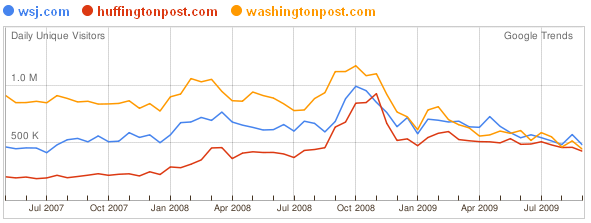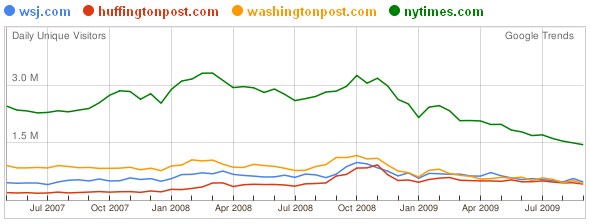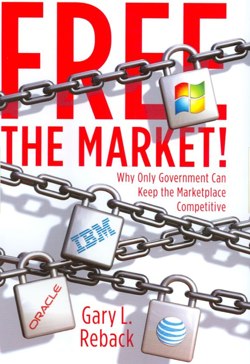FCC chair Julius Genachowski has certainly been busy. This week, of course, he’s been occupied with regulating the Internet. But last week, he was busy fending off charges on talk radio and elsewhere that the FCC has its very own “speech” or “diversity” czar.
At issue was the appointment in August of ex-journalist and Center for American Progress fellow Mark Lloyd to be the agency’s “chief diversity officer.” That appointment instantly caused controversy, with Lloyd has becoming a cause celebre on conservative talk radio and in the blogoshere, where he was been portrayed as yet another in a long line of powerful and unaccountable Obama policy czars and – in light of his support of government regulation of TV and radio content – a threat to free speech. Nationally syndicated talk show host Glenn Beck led the charge, at one point twittering his listeners: “Watch Dogs: FIND OUT EVERYTHING YOU CAN” about Lloyd and several other “czars.”
But the critics had their facts wrong. Lloyd was never chosen to be a “czar” of anything. That regal title – and its connotations of unlimited influence — were entirely invented by overactive imaginations in the media. Lloyd’s actual position in the FCC bureaucracy is much more prosaic — “associate general counsel.” He serves in that position along with three other associate general counsel, and three deputy general counsels. Anyone who’s worked at the FCC knows that is an unlikely locus of power.
Continue reading →
Forbes.com has just published an editorial that Berin Szoka and I penned about yesterday’s net neutrality announcement from the FCC.
by Adam Thierer & Berin Szoka
There was a time, not so long ago, when the term “Internet Freedom” actually meant what it implied: a cyberspace free from over-zealous legislators and bureaucrats. For a few brief, beautiful moments in the Internet’s history (from the mid-90s to the early 2000s), a majority of Netizens and cyber-policy pundits alike all rallied around the flag of “Hands Off the Net!” From censorship efforts, encryption controls, online taxes, privacy mandates and infrastructure regulations, there was a general consensus as to how much authority government should have over cyber-life and our cyber-liberties. Simply put, there was a “presumption of liberty” in all cyber-matters.
Those days are now gone; the presumption of online liberty is giving way to a presumption of regulation. A massive assault on real Internet freedom has been gathering steam for years and has finally come to a head. Ironically, victory for those who carry the banner of “Internet Freedom” would mean nothing less than the death of that freedom.
We refer to the gradual but certain movement to have the federal government impose “neutrality” regulation for all Internet actors and activities—and in particular, to yesterday’s announcement by Federal Communications Commission (FCC) Chairman Julius Genachowski that new rules will be floated shortly. “But wait,” you say, “You’re mixing things up! All that’s being talked about right now is the application of ‘simple net neutrality,’ regulations for the infrastructure layer of the net.” You might even claim regulations are not really regulation but pro-freedom principles to keep the net “free and open.”
Such thinking is terribly short-sighted. Here is the reality: Because of the steps being taken in Washington right now, real Internet Freedom—for all Internet operators and consumers, and for economic and speech rights alike—is about to start dying a death by a thousand regulatory cuts. Policymakers and activists groups are ramping up the FCC’s regulatory machine for a massive assault on cyber-liberty. This assault rests on the supposed superiority of common carriage regulation and “public interest” mandates over not just free markets and property rights, but over general individual liberties and freedom of speech in particular. Stated differently, cyber-collectivism is back in vogue—and it’s coming very soon to a computer near you! Continue reading →
Google Trends for websites reveals all kinds of fascinating insights into the way technology is reshaping the world. Among them is the fact that the HuffingtonPost.com has matured from a scruffy group blog into a new media powerhouse to rival the Wall Street Journal and Washington Post:

Note that the convergence of these three sites has happened both because HuffPo has doubled its audience and because the audience for the WashingtonPost.com has shrunk by half. While WSJ.com’s audience has returned to roughly its pre-election level, the decline of NYTimes.com suggests that the Internet really is splintering audiences and bringing the giants of news media like the “Gray Lady” down from their once unassailable heights:

If I can amplify a bit on a post at the Cato blog earlier today, I want to clarify that I fully agree some of the ISP behaviors that net neutrality proponents have identified as demanding a regulatory response really are seriously problematic. My point of departure is that I’d rather see if there are narrower grounds for addressing the objectionable behaviors than making sweeping rules about network architecture. So in the case of Comcast’s throttling of BitTorrent, which is the big one that seems to confirm the fears of the neutralists, I think it’s significant that for a long while the company was—”lying about” assumes intent, so I’ll charitably go with “misrepresenting”—their practices. And I don’t think you need any controversial premises about optimal network management to think that it’s impermissible for a company to charge a fee for a service, and then secretly cripple that service. So without even having to hit the more controversial “nondiscrimination” principle Julius Genachoswki proposed on Monday, you can point to this as a failure of the “transparency” principle, about which I think there’s a good deal more consensus. Now, there are bigger guns out there looking for dodgy filtering practices these days, so I’d expect the next attempt at this sort of thing to get caught more quickly, but by all means, enforce transparency about business practices too. Consumers have a right to get the service they’ve bought without having to be 1337 haxx0rz to discover how they’re being shortchanged. But before we get the feds involve in writing code for ISP routers, I’d like to see whether that proves sufficient to limit genuinely objectionable deviations from neutrality.
There’s a hoary rule of jurisprudence called the canon of constitutional avoidance. It means, very crudely, that judges don’t decide broad constitutional questions—they don’t go mucking with the basic architecture of the legal system—when they have some narrower grounds on which to rule. So if, for instance, there are two reasonable interpretations of a statute, one of which avoids a potential conflict with a constitutional rule, judges are supposed to prefer that interpretation. It’s not always possible, of course: Sometime judges have to tackle the big, broad questions. But it’s supposed to be something of a last resort. Lawyers and civil liberties advocates, of course, tend to get more animated by those broad principles, whether the First Amendment or end-to-end. But there’s often good reason to start small—to look to the specific fact patterns of problem cases and see whether there are narrower bases for resolution. It may turn out that in the kinds of cases that neutralists rightly warn could harm innovation, it’s not one big principle, but a diverse array of responses or fixes that will resolve the different issues. In a case like this one, perhaps a mix of mandated transparency, consumer demand, and user adaptation (e.g. encrypting traffic) will get you the same (or a better) result than an architectural mandate.
Continue reading →
 Two great articles today about the dangers of government getting too involved in the newspaper business as the industry experiences serious marketplace difficulties. Slate’s Jack Shafer (“Saving Newspapers From Their Saviors“) and Mark Hopkins of Silicon Angle (“Obama Administration ‘Open’ to State Run Newspapers“) both raise concerns about President Obama’s recent comments hinting that he is open to legislation that might grant struggling news organizations tax breaks if they were to restructure as nonprofit businesses.
Two great articles today about the dangers of government getting too involved in the newspaper business as the industry experiences serious marketplace difficulties. Slate’s Jack Shafer (“Saving Newspapers From Their Saviors“) and Mark Hopkins of Silicon Angle (“Obama Administration ‘Open’ to State Run Newspapers“) both raise concerns about President Obama’s recent comments hinting that he is open to legislation that might grant struggling news organizations tax breaks if they were to restructure as nonprofit businesses.
In a piece for the City Journal back in March entitled “Socializing Media in Order to Save It,” I discussed the specific proposal in question, Senator Benjamin L. Cardin’s (D-MD) bill, S. 673, the “Newspaper Revitalization Act,” which would allow newspapers to become nonprofit organizations in an effort to help them stay afloat. Importantly, however, the measure would also disallow political endorsements on their editorial pages as part of the deal. In my essay, I pointed out how “If the FCC received grant-making authority to dole out subsidies to media operators… it’s hard to imagine how journalists won’t be expected to surrender something in exchange.” And that something would be their journalistic independence.
Shafer and Hopkins raise similar concerns in their essays. Continue reading →
Julius Genachowski, the new FCC chairman, announced that the commission will begin a rulemaking process to formalize and supplement existing network neutrality policy. According to Genachowski,
This is not about government regulation of the Internet. It’s about fair rules of the road for companies that control access to the Internet. We will do as much as we need to, and no more, to ensure that the Internet remains an unfettered platform for competition, creativity, and entrepreneurial activity.
Of course it is about regulation. The formal rulemaking process Genachowski is planning is for the avowed purpose of enshrining network neutrality principles in the Code of Federal Regulations.
Regulation always starts out small, before it grows really big. It has to: Loopholes and other unintended consequences (and opportunities) are always discovered after the “product” launches.
Genachowski unfairly and innaccurately implies that network neutrality opponents want to “abandon the underlying values fostered by an open network, [and] the important goal of setting rules of the road to protect the free and open Internet.” In fact, the existing Internet Policy Statement that would serve as the foundation of a new network neutrality regulatory regime received 2 Republican votes and 2 Democrat votes.
Genachowski is attempting to present a false choice between letting minimally trained politicians and myopic bureaucrats get their hands all over the Internet to remake it as they see fit versus “doing nothing.”
Saying nothing — and doing nothing — would impose its own form of unacceptable cost. It would deprive innovators and investors of confidence that the free and open Internet we depend upon today will still be here tomorrow. It would deny the benefits of predictable rules of the road to all players in the Internet ecosystem. And it would be a dangerous retreat from the core principle of openness — the freedom to innovate without permission — that has been a hallmark of the Internet since its inception, and has made it so stunningly successful as a platform for innovation, opportunity, and prosperity.
Continue reading →
Blogger’s Note: I posted this blog entry over at BroadbandCensus.com earlier in the day. It’s the first of series this week — One Web Week — in which I’m taking a step back to look at the issue of broadband data and broadband transparency from a bit of a longer time frame. And today couldn’t be a more timely day to do so, with Genachowski’s speech highlighting a new sixth principle of Network Neutrality: broadband transparency! -Drew Clark
WASHINGTON, September 21, 2009 – Broadband data is important for the future of our country – and public and transparent broadband data is even more important.
Today, at this moment, new Federal Communications Commission Chairman Julius Genachowski is making a speech in which he is highlighting the vital principle of public and transparent broadband data.
For three years now, this principle has been the core belief animating my efforts as a journalist, and as the entrepreneur founding BroadbandCensus.com. Now, as we enter the fourth year since this saga began, it’s time to take stock and reflect on what BroadbandCensus.com has accomplished.
And with One Web Week having arrived, I’d like to lay out this history from a personal perspective. In this series of blog posts, I’m going to speak about what we’ve been through, who we have worked with to advance the principles of public and transparent broadband data, and what we ultimately aim to achieve at BroadbandCensus.com.
- Today’s topic: The debate begins, with the Freedom of Information Act lawsuit in 2006.
- Tomorrow’s topic, on One Web Day: The founding of BroadbandCensus.com in the fall of 2007.
- Wednesday topic: The Broadband Census for America Conference in September 2008, and our work with the academic community to foster public and transparent broadband data-collection efforts.
- Thursday’s topic, in advance of the U.S. Broadband Coalition’s report to the Federal Communications Commission: BroadbandCensus.com’s involvement with the National Broadband Plan in 2009.
- The concluding topic, on Friday morning: The role BroadbandCensus.com and broadband users have to play in the creation of a robust and reliable National Broadband Data Warehouse.
The Beginnings: Why I Sued Kevin Martin’s Federal Communications Commission
BroadbandCensus.com was founded in October 2007 after I spent nearly a year and a half with the Center for Public Integrity, a non-profit investigative journalism organization based here in Washington. But the quest for public and transparent broadband data goes back further.
Continue reading →
The FCC announced today that it will consider adopting net neutrality rules. The announcement comes in a speech by Chairman Julies Genachowski, which you can read here and watch here. Genachowski says,
To date, the Federal Communications Commission has addressed these issues by announcing four Internet principles that guide our case-by-case enforcement of the communications laws. … The principles were initially articulated by Chairman Michael Powell in 2004 as the “Four Freedoms,” and later endorsed in a unanimous 2005 policy statement[.] … Today, I propose that the FCC adopt the existing principles as Commission rules, along with two additional principles that reflect the evolution of the Internet and that are essential to ensuring its continued openness.
By suggesting that they must be codified, Genachowski is implicitly (if not explicitly) conceding that the FCC’s Internet principles are a mere policy statement and not a binding and enforceable rule. I’ve explained why this is the case previously. So, someone should call the D.C. Circuit, considering the Comcast case, and let them know their job just got a lot easier.
Second, Genachowski gives “limited competition” as a reason to consider regulation. However, the best available data from the FCC show that 98% of zip codes have 2 or more broadband providers, 88% of zip codes have 4 or more broadband providers, and 77% of zip codes have 5 or more broadband providers. That said, some have questioned whether the FCC’s data are accurate, and the FCC’s next broadband report is supposed to have data gathered at the census tract level for a more detailed set of speed categories. So, the FCC is proposing a regulation before it has completed an ongoing study to discover whether there is a real problem. It’s almost as if Kevin Martin is still running the place.
 I recently finished reading Free the Market: Why Only Government Can Keep the Marketplace Competitive, a new book by noted antitrust agitator Gary L. Reback. Unsurprisingly, Reback, who led the antitrust jihad against Microsoft during the 1990s, has written a book that reads like an extended love letter to antitrust law. This man loves antitrust the way teenage girls love the Jonas Brothers — gushing, teary-eyed, ‘I-would-just-die-for-you’ sort of love. In Reback’s world, antitrust seemingly has no costs, no downsides, no trade-offs. It is our salvation and he serves as its high prophet. Everything good that happened in the world of high-tech over the past few decades? Oh, you can thank Almighty Antitrust for that. Anything bad that happened? Well, then, clearly there just wasn’t enough antitrust enforcement! That’s this book in a nutshell.
I recently finished reading Free the Market: Why Only Government Can Keep the Marketplace Competitive, a new book by noted antitrust agitator Gary L. Reback. Unsurprisingly, Reback, who led the antitrust jihad against Microsoft during the 1990s, has written a book that reads like an extended love letter to antitrust law. This man loves antitrust the way teenage girls love the Jonas Brothers — gushing, teary-eyed, ‘I-would-just-die-for-you’ sort of love. In Reback’s world, antitrust seemingly has no costs, no downsides, no trade-offs. It is our salvation and he serves as its high prophet. Everything good that happened in the world of high-tech over the past few decades? Oh, you can thank Almighty Antitrust for that. Anything bad that happened? Well, then, clearly there just wasn’t enough antitrust enforcement! That’s this book in a nutshell.
Think I’m kidding? How about this gem of quote from pg. 247: “Antitrust enforcement spawned Silicon Valley’s software industry as well.” Wow, who knew! Of course, that’s utter poppycock and should be somewhat insulting to the many entrepreneurial men and women in the high-tech world who risked everything in an attempt to build a better mousetrap. In Reback’s view of things, however, none of those mousetraps would have ever gotten built without antitrust there to supposedly shelter them from wicked “monopolists” (read: any large company) already operating in the marketplace. I’m sure many in Silicon Valley will also be surprised to hear Reback’s assertion that, “On closer examination, the Valley looks like one big public welfare project.” (p. 54) Ah yes, the old myth that government gave us the Net we know and love today. Please. Like many others, Reback spins a revisionist history of how early ARPANET involvement and seed money somehow made the Internet great when, in reality, the Net was stuck in the digital dark ages until it was finally allowed to be commercialized in 1992.
What irks me most about this book, however, is Reback’s perpetuation of the myth that antitrust is somehow not a form of economic regulation. I hear this tired old argument trotted out time and time again, even by many conservatives. Reback says, for example, that “Antitrust sets the rules of the road, so to speak, but doesn’t tell people where to drive.” By contrast, he argues, “Advocates of regulation want[] continuing government oversight and rule making to produce what would be the beneficial results of a free market… Neither approach works all the time, and decided between them remains difficult.” (p. 19) Again, this “choice” is largely a fiction since, for many industries, we end up getting both! Continue reading →
In his brilliantly-titled essay, Of Dynamic Media, Steamed Dinners, and Bare Breasts, PFF’s Ken Ferree points out that FCC’s “Janet Jackson case” just continues to wind on and on and on. There is basically no end in sight for this case, CBS Corp. vs. FCC or the other major ongoing broadcast indecency case, FCC v. Fox, even though the incidents that motivated these cases took place years ago (between 2002-2204). As Ken notes:
Can we not all agree that there is something wrong with this process? The media landscape has changed dramatically, even since that fateful day in 2004 when Justin Timberlake pulled the veil from the now senescent Ms. Jackson, and it will likely be unrecognizable by the time any final conclusion in this matter is reached — which could be another ten years hence.
The problem is that the wheels of justice turn slowly while the wheels of technology propel the media markets ahead at a blistering pace. We simply can’t go on pretending that broadcasting is what it was in the 1970s, 1980s, or even in the 1990s. The markets have changed, the number of program options has grown, consumers’ usage patterns have become more varied and variable, new delivery platforms have evolved, and the technologies available to manage media on a personal level — especially for parents — have become ever more sophisticated. It is time the “expert” agency recognize the media revolution that has occurred and abandon its holy war on broadcasting.
Ken’s got it exactly right when he notes that “the wheels of justice turn slowly while the wheels of technology propel the media markets ahead at a blistering pace.” Indeed, Janet Jackson will probably be an old woman living in a Florida nursing home by the time this case winds its way back and forth through the courts and finally comes to a conclusion.





 The Technology Liberation Front is the tech policy blog dedicated to keeping politicians' hands off the 'net and everything else related to technology.
The Technology Liberation Front is the tech policy blog dedicated to keeping politicians' hands off the 'net and everything else related to technology.